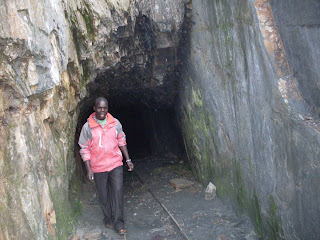Kirwa wolfram mine ownership wrangle takes new twist
By Stephen Nuwagira
The ownership wrangle for the Kirwa wolfarm mine in Kisoro has taken a new twist with economic planning and monitoring state minister Henry Banyenzaki, saying Kirwa Wolfram Mines Limited owner Sebuhingiriza Rwabiti, should not have been barred from accessing his property at the mine.
The properties include houses, a car, generators, mining equipment, office furniture and household items, which Rwabiti was stopped from accessing when the mine was gazette as a government protected area in August.
Kirwa Wolfram Mines operated the mine said to be the biggest wolfram mine in Uganda for 37 years since 1974. The firm was denied a licence in 2002 under unclear circumstances.
Banyenzaki argued that by denying Rwabiti access to the property or allowing him remove them; the mineral development officials were trampling on his human rights.
“Whoever denied him the right to access and shift his property is wrong. It is not right and contravenes his rights as provided in the constitution,” he said. He also condemned the destruction of Rwabiti’s property and mining equipment, saying the Kisoro Police must held accountable.
Banyenzaki was speaking in an interview after visiting the Kirwa wolfram mine and other mineral-rich areas in Kisoro recently.
He advised Rwabiti to invite his Germany partners to come and meet him and forge a way forward.
He revealed that the Government was working with all the stakeholders to find a solution to the Kirwa wolfram mine ownership wrangle that has raged on since 2002.
The minister had earlier met the Kisoro RDC, the district chairman Milton Bazanye and other district officials over the Kirwa mine ownership wrangle. He also visited tin and gold mines in Rubuguri sub-county.
Last month, President Yoweri Museveni confirmed to the people of Kisoro that he instructed the then mineral development minister Hilary Onek to ensure that Rwabiti gets his mining rights back. The President also disowned a letter purported to have been written by him in March 2010 withdrawing the directive, saying it was a forgery. This was after agriculture minister Tress Buchanayandi, had asked him to clear the air about two letters.
Parliament is currently investigating claims by businessman Hassan Bassajjabalaba and State House officials over letters reportedly written by the President.
Museveni was in the district to thank the people for supporting him and NRM in the February general elections.
New Vision broke the story of the Kirwa mine ownership wrangle on December 6, 2011.
Wolfram is used in the making of drilling metals, armour plates, rocket engines and parts, electric bulbs and filament and bombs.
Meanwhile, the geological survey and mineral development commissioner has been dragged to court for ignoring the President’s directive to reinstate Kirwa Wolfram Mines Limited’s operational licence.
In an application for a judicial review, Rwabiti asked the High Court to order acting commissioner John Odida to fulfill the President’s directive, reinstate his licence and quash the commissioner’s decision to gazette the mine as a government protected area.
Rwabiti argued in the December 12, 2011 application that the commissioner had no reason to ignore the President’s directive.
He also wants the court to prevent the commissioner from leasing the mine to other firms or individuals.
Odida is expected to file his defence before January 31, 2012 when the judicial review application will be heard.
Odida acknowledged receipt of the application, saying there was nothing to charge them with. “I had told them to wait because the issue is being handled at a higher level, but they didn’t listen. Government will handle the case as it is the one in charge of the problem now,” he said in a telephone interview on Thursday December 29, 2011.
Dei Minerals International and Videocom operated the mines for the past six. Their prospecting licence expired in August, 2011.


